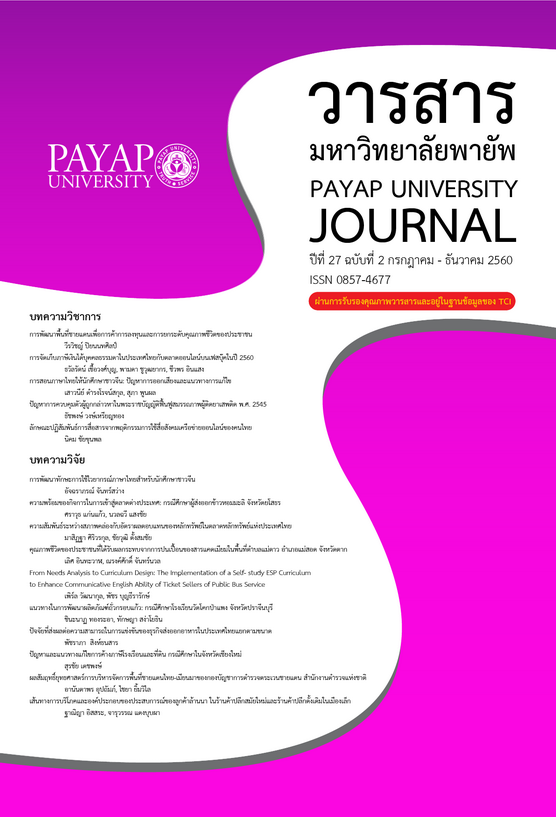From Needs Analysis to Curriculum Design: The Implementation of a Self- study ESP Curriculum to Enhance Communicative English Ability of Ticket Sellers of Public Bus Service
Main Article Content
Abstract
This study aims to investigate functional English language’s needs of public bus ticket sellers and to develop a Self- study English for Specific Purposes (ESP) Curriculum package to enhance communicative English ability of bus ticket sellers in the northern part of Thailand. 86 bus ticket sellers were randomly selected for the needs analysis, and 30 ticket sellers for the implementation of the Self- Study ESP course. The research instruments used were a needs survey questionnaire, a needs focus-group interview, a situational analysis observation, a preliminary functional English test, an Functional Communicative English performance test, a follow- up interview and reflection. Based on needs analysis results, a Self-Study ESP Curriculum package was developed. The results show that the ticket sellers realized the importance of English for their job, wanted to improve functional English speaking and listening the most. They preferred learning by themselves with learning aids. Additionally, the ticket sellers’ communicative English ability significantly increased after the implementation of the Self- Study ESP curriculum. In conclusion, the Self- Study ESP Curriculum package is effective in enhancing the ticket sellers’ communicative English ability.
Article Details
References
Basturkmen, H., (2010). Developing Courses in English for Specific Purposes. New York: Palgrave Macmillan
Cohen, V and Cowen, J. (2007). Literacy for Children in an Information Age: Teaching Reading, Writing, and Thinking. California: Cengage Learning
Dublin, F. and Olshtain, E. (1986). Course Design: Development program and Materials for Language Learning. Cambridge: Cambridge University Press
Huhta, M., Vogt, K., Johnson, E., and Tulkki, H. (2013). Needs Analysis for Language Course Design: A Holistic Approach to ESP. Cambridge: Cambridge University Press.
Hutchinson, T., & Water, A. (2001). English for Specific Purposes (16th Ed). Cambridge: Cambridge University Press.
Kalasin, S., and Charumanee, N. (2015). English needs of Thai front Desk Staff in Tourist Attractions of Southern Thailand in the Move towards ASEAN Economic Community 2015. Journal of Liberal Arts, Prince of Songkla University, Hat Yai Campus.7(2) July-December,1-22
Nation, I.S.P. and Macalister,J. (2010). Language Curriculum Design. New York: Routledge
Nunan. D. (1988). The Learner-Centred Curriculum. Cambridge: Cambridge University Press
Park, S. (2008). Self-directed Learning in the Workplace. Retrieved January 12, 2016, from file.eric.ed.gov
Prachanant, N. (2012). Needs Analysis on English language Use in Tourism Industry. Procedia Social and Behavioral Sciences, 66 117-125.
Priyasil, Y. (2014). English Language Needs of Tourism Industries in Khon Kaen Province. Journal of Thai Hospitality & Tourism, Retrieved from https://wwwtci-thaijo.org/index.php/tourismtaat/article/view/24838
Richards, J.C. (2001). Curriculum Development in Language Teaching. Cambridge: Cambridge University Press.
Saville-Troike, M. (2006). Introducing second language acquisition. New York: Cambridge University Press.
Tourism Statistics Thailand 2000-2017, Source data : Department of Tourism, Thailand, retrieve, February 2017, https://www.thaiwebsites.com/tourism.asp
Wongsothorn, A. (2003). Levels of English Skills of Thai Students, Volume 1, Number 2 Issue, May, 2003, EJRT E-Journal for Research Teacher, Retrieved from https://www.culi.ac.th/Research/e-journal/EJournal01.html

